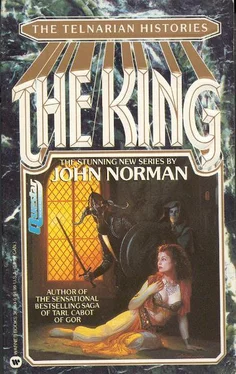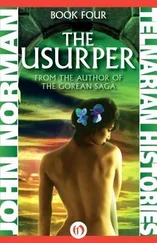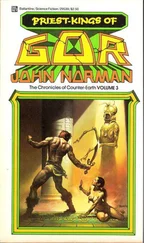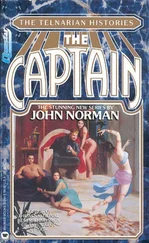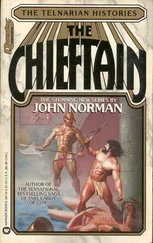Urta, for he was the King Namer, slipped away later, that he might inform the Heruls of what had occurred.
The chieftains of the Heruls were not pleased to learn that the Otungen had lifted one upon the shields, even a stranger, for year kings are not lifted upon the shields, but only other sorts of leaders, such as lords of clans, chieftains, commanders of battle groups, and such, and kings.
Too, they were disturbed to learn that the stranger had brought to the hall the pelt of a white vi-cat.
Such things were not permitted to year kings.
To be sure, he who had been lifted upon the shields did not have the medallion and chain, which had seemingly been lost.
In a sense then, though he might be king, he was not to be feared as might have been a king who wore both the mantle of the white vi-cat and the ancient medallion and chain of the Otungen. The medallion and chain might unite not only the clans of the Otungen, but the other tribes, as well, of the Vandal nation.
Urta, bowing, withdrew from the council of the Heruls. They did not put him to death, but gave him golden darins , from Venitzia.
An old Herul warrior, whose name was Hunlaki, one of the far riders and hard fighters of that warlike nomadic people, might, if urged, or pressed, have been able to supply some informed speculation as to the possible whereabouts of the medallion and chain, but he was not of the high council of the Heruls, and he had not, in his own knowledge, an understanding of its significance, even though, once, years ago, after a campaign against Basungs, it seems quite possible that he may have held it in his hands. The high council knew its meaning, as Hunlaki did not. Hunlaki, on the other hand, might have had some sense of its fate, and whereabouts, as did neither the council nor the Otungen. To be sure, memory tends to be fallible, and the incident, if it had occurred, had occurred long ago.
It seemed quite clear to the Heruls that the Otungen had elected a king who was not a year king, but, against their wishes, and their clearly expressed ordinance and policy, in some sense, a true king, even if one lacking the medallion and chain. Accordingly they decided to move against the Otungen.
We do not know, exactly, why the stranger took the hero’s portion at the feast of the king naming.
He may have taken the hero’s portion that the strife amongst the Otungs might be thusly resolved, that their lack of unity and the plight of their rivalries might be abolished, or at least, for a time, assuaged. Too, he may have adopted this course of action simply as an instrumentality conducive to the recruitment of men, comitates , comites , companions, a retinue, for a mercenary company. Ostensibly, at least, such seems to have been his original purpose in approaching Otungs. Others see some sensing of an obscure reality in the matter, a sensing of fittingness, a response to a prompting of blood or instinct, thusly not so much that he saw an opportunity, in a time of confusion, uncertainty, and chaos, to seize a kingship, as that it seemed to him fitting that he should do so, that it, in some sense, was his, that it belonged to him. To be sure, this possibility is perhaps too uncertain and too disturbing to be accepted as a hypothesis. Others see the matter merely as a warrior’s dark jeu d’esprit , brief, terrible, and celebratory, no more than a momentary, exultant gesture, or game, or festival, of blood and steel, and some, even, that it was merely that he was indeed hungry, and had decided to feed, in his uncouth, boorish manner, and that one event had led to another. We do not know the truth of the matter. Perhaps there are many truths, and they are woven somehow together, to form the tapestry of existence, the subtle, somber, some bright, some dark, threads, or cords, of reality. In historical studies it is often hard, trying to peer back into the mists of time, to ascertain even the deeds of men; how much harder it is then to look into their hearts. Too, it is a sobering thought, but it is well to remember that those hearts may be quite different from our own. Our beliefs, our values, our worlds, may not be the beliefs, values, or worlds of others. Doubtless we would find it difficult to enter the experience of the serpent, the wolf, the hawk, the vi-cat. Perhaps, too, then, we would find it difficult to enter into the experiences of men which may be quite different from ours, experiences perhaps more akin to those of the serpent, the hawk, the wolf, and the vi-cat, to those of predators, to those of beasts, than they are to ours. But, doubtless, even so, there is a kinship. It seems likely that nothing which is human can be utterly alien to us. Each of us, doubtless, carries in our heart many things. In historical studies it is not impossible to find the present, and ourselves.
No sooner had the giant leapt down into the snow, under the stars, from the shields, to the shouting and the clashing of weapons, than a warrior thrust aside others, and confronted him. “Let us laugh with steel!” he cried, tears in his eyes. The warrior was seized by those about, and, struggling, held fast. A blade was instantly at his heart, poised there by young Vandar, the first of the Otungs who had seized up the hot meat on the table before him, and fed upon it, his eyes on his lord, Otto, who had just been acknowledged by Urta as king of the Otungs.
Otto gestured that Vandar should lower his weapon.
Otto gestured that the warrior should be released.
“Let us laugh with steel,” said again the warrior, to Otto, king of the Otungen.
Men cried out with rage for their lord had again been threatened. Had Otto not raised his hand, conveying to them that they must desist, furs would have surged about the bold fellow, the press of a hundred knives, in turn, responding to his insolence.
“Let him laugh with me!” cried Vandar.
“No, with me!” cried others.
Men looked angrily at one another.
Each would vie with each to defend to the death their liege lord.
“How is it that you so speak to your king?” asked Otto of the bold fellow.
“I want the slave girl,” said Citherix.
There was a soft, startled cry from the side where, miserable, shivering, partly bent over, her arms clutched about her, stood blond Yata, the slave of Otto. She had crept forth from the hall, and, until then, had been muchly unnoticed. Aware of eyes upon her, she knelt in the snow, putting her head down to it.
“I will give you a thousand sheep, and a thousand pigs, for her,” said Citherix.
Men cried out, amazed, at the bounty of such an offer.
“She is not for sale,” said Otto.
“Let us laugh with steel,” said Citherix.
“You must want her very much,” said Otto.
“I must have her,” said Citherix.
“But she is not yours,” said the giant.
“I will have her or die,” said Citherix.
“I do not understand,” said the giant.
“I love her,” said Citherix, angrily.
The slave, to the side, cried out, startled, softly.
There was rude laughter amongst the men and women outside the hall. “He loves a slave!” laughed a man.
“A slave!” laughed another.
“He is a fool!” said a man.
“Yes,” said another.
There was more laughter.
“I will have her or die,” said Citherix.
“As you wish,” said Otto. “Bring me my sword,” said he to Vandar.
In a moment the great sword was in his hands.
“Do you think you can best me?” asked the giant.
“No,” said Citherix.
“But yet you would laugh with steel?”
“Yes,” said Citherix.
Men cleared a space in the snow about them. It was some fifteen feet in diameter.
“Please, no, Master!” cried the slave.
“Cuff her,” said Otto.
Читать дальше
